Journey with us to the Azores Islands, a breathtaking archipelago nestled amidst the Atlantic Ocean. These emerald gems, with their volcanic origins and subtropical charm, offer a captivating blend of natural beauty, rich history, and vibrant culture. Immerse yourself in the unique landscapes, diverse flora and fauna, and warm hospitality that make the Azores an unforgettable destination.
From the towering peaks of Mount Pico to the tranquil shores of Faial, each island unveils its own allure. Discover the archipelago’s fascinating geological history, shaped by volcanic eruptions and tectonic forces. Bask in the year-round mild climate, influenced by the Gulf Stream and North Atlantic currents, creating a haven for nature enthusiasts and outdoor adventurers.
Geographical Overview
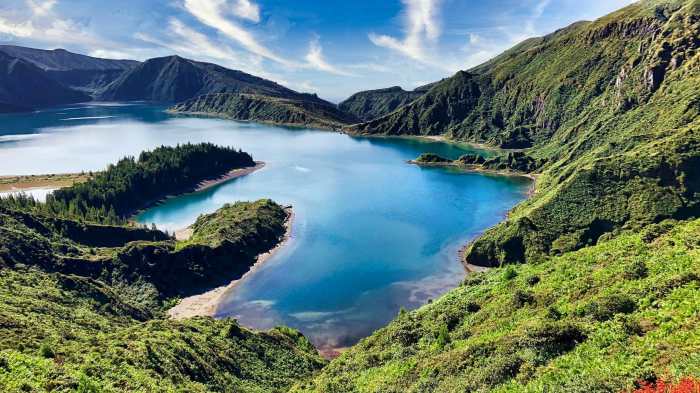
The Azores Islands are a group of nine volcanic islands located in the North Atlantic Ocean, about 1,500 kilometers (930 miles) west of mainland Portugal. The islands are divided into three groups: the Eastern Group, the Central Group, and the Western Group.
The Eastern Group consists of the islands of São Miguel, Santa Maria, and the Formigas Islets. São Miguel is the largest and most populous island in the Azores, with a population of over 130,000. Santa Maria is the oldest island in the archipelago, and it is known for its beautiful beaches and its vineyards. The Formigas Islets are a group of small, uninhabited islands located about 10 kilometers (6 miles) south of São Miguel.
The Central Group consists of the islands of Terceira, Graciosa, São Jorge, Pico, and Faial. Terceira is the second largest island in the Azores, and it is known for its historic city of Angra do Heroísmo, which is a UNESCO World Heritage Site. Graciosa is a small, peaceful island that is known for its beautiful scenery and its traditional windmills. São Jorge is a long, narrow island that is known for its dramatic cliffs and its hiking trails. Pico is the highest island in the Azores, and it is home to Mount Pico, which is the highest mountain in Portugal. Faial is a small, green island that is known for its beautiful scenery and its friendly people.
The Western Group consists of the islands of Flores and Corvo. Flores is the westernmost island in the Azores, and it is known for its beautiful scenery and its wildflowers. Corvo is the smallest and least populous island in the Azores, with a population of just over 400 people.
The Azores Islands are of volcanic origin, and they were formed by the movement of the North American and Eurasian tectonic plates. The islands are located on the Mid-Atlantic Ridge, which is a spreading center where new oceanic crust is being formed. The islands are made up of lava flows, ash, and pumice, and they are constantly being reshaped by volcanic activity.
Climate and Weather: Azores Islands
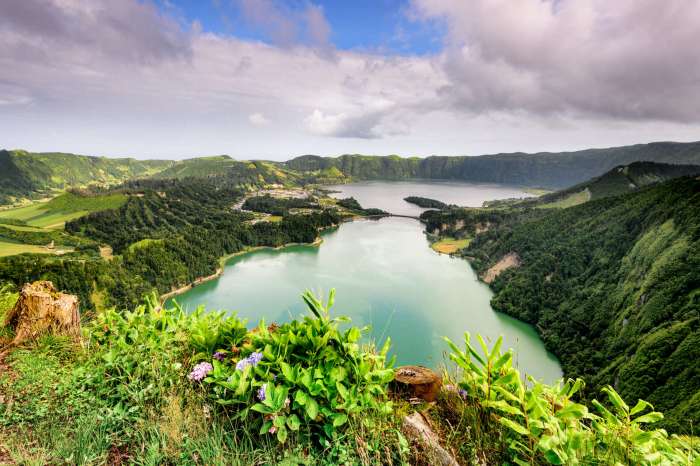
The Azores enjoys a unique subtropical climate, with mild temperatures year-round. The Gulf Stream and North Atlantic currents significantly influence the archipelago’s weather patterns, bringing warm, moist air from the tropics. As a result, the Azores experiences relatively stable weather conditions with minimal seasonal variations.
Average Temperatures
The average temperature in the Azores ranges from 14°C (57°F) in the winter months to 24°C (75°F) in the summer months. The archipelago’s location in the North Atlantic Ocean ensures that temperatures remain moderate throughout the year, with little fluctuation between day and night.
Rainfall and Humidity
The Azores receives ample rainfall, with an average annual precipitation of 1,000 mm (39 in). The archipelago experiences a fairly even distribution of rainfall throughout the year, with slightly wetter conditions during the winter months. The humidity levels in the Azores are generally high, ranging from 70% to 90%, which contributes to the islands’ lush vegetation.
Flora and Fauna
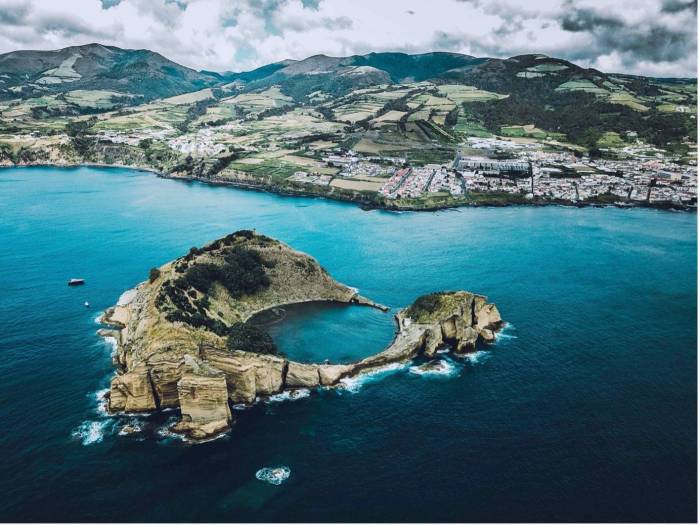
The Azores archipelago boasts a remarkable diversity of flora and fauna, with many endemic species found nowhere else on Earth.
The lush landscapes of the islands are home to a wide variety of plant life, including endemic species such as the Azores heather (Erica azorica) and the Azores laurel (Laurus azorica). The islands are also known for their vibrant wildflowers, including hydrangeas, azaleas, and camellias.
Marine Ecosystem
The surrounding waters of the Azores are teeming with marine life. The archipelago is a major breeding ground for cetaceans, including whales, dolphins, and porpoises. Other marine animals found in the area include sea turtles, sharks, and a variety of fish species.
Conservation Efforts
Recognizing the importance of its unique biodiversity, the Azores government has established a network of protected areas to conserve the islands’ flora and fauna. These areas include the Azores National Park, which covers a significant portion of the island of São Miguel, and the Graciosa Natural Reserve, which protects the island of Graciosa.
Conservation efforts in the Azores have focused on protecting endangered species, such as the Azores bullfinch (Pyrrhula murina), and restoring degraded habitats. The government has also worked to raise awareness of the importance of conservation among the local population and visitors to the islands.
History and Culture
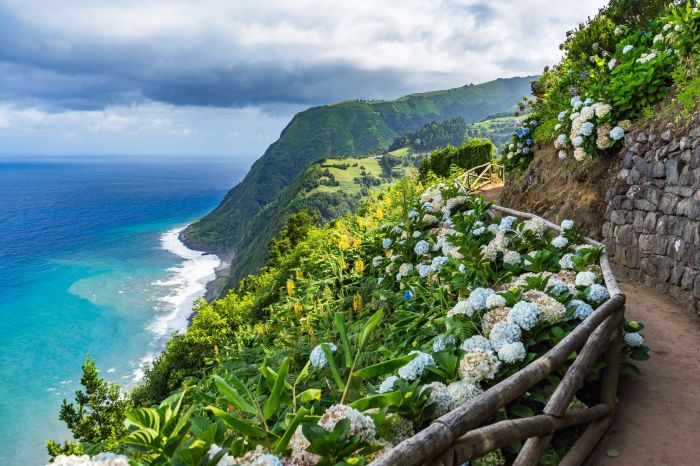
The Azores, located in the mid-Atlantic Ocean, have played a significant role in maritime history and transatlantic navigation. Their strategic location made them a crucial stopover for ships traveling between Europe and the Americas.
Portuguese Discovery and Settlement
The Azores were first discovered by Portuguese explorers in the early 15th century. The islands were uninhabited at the time, and the Portuguese quickly established settlements. The first permanent settlement was founded in 1427 on the island of Santa Maria.
Cultural Heritage and Traditions
The Azorean people have a rich cultural heritage that has been influenced by both Portuguese and local traditions. The islands’ isolation has helped to preserve many unique customs and practices.
- Music: The Azores is known for its traditional music, which features a blend of Portuguese and African influences.
- Dance: Traditional Azorean dances include the chamarrita, a lively dance performed in pairs.
- Crafts: The islands are also known for their traditional crafts, such as pottery, weaving, and embroidery.
Tourism and Recreation
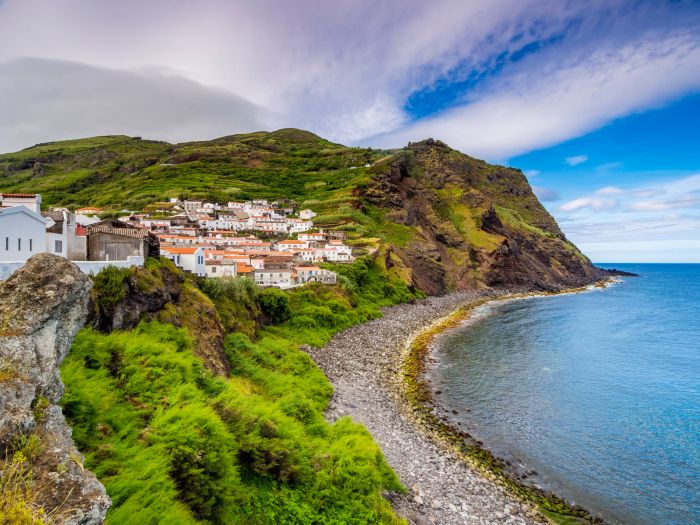
The Azores islands are a haven for nature enthusiasts and outdoor adventurers. The stunning landscapes, crystal-clear waters, and diverse flora and fauna make the islands a perfect destination for hiking, swimming, diving, whale watching, and more.
The tourism infrastructure in the Azores is well-developed, with a range of accommodation options to suit all budgets. There are also good transportation links between the islands, making it easy to explore the archipelago.
Sustainable tourism is a priority in the Azores, and there are a number of initiatives in place to protect the environment and promote responsible travel. Visitors are encouraged to respect the local culture and traditions, and to minimize their impact on the natural environment.
Hiking
The Azores islands offer a variety of hiking trails, ranging from easy walks to challenging treks. The trails wind through lush forests, past sparkling lakes, and up to the summits of towering volcanoes.
Swimming
The Azores islands have many beautiful beaches, with something to offer everyone. There are sheltered coves perfect for swimming, sunbathing, and snorkeling, as well as more exposed beaches with waves ideal for surfing and bodyboarding.
Diving
The Azores islands are a world-renowned diving destination. The clear waters and diverse marine life make for an unforgettable experience. Divers can explore underwater caves, shipwrecks, and volcanic formations, and encounter a variety of marine life, including dolphins, whales, and sharks.
Whale Watching
The Azores islands are one of the best places in the world to go whale watching. The islands are home to a variety of whale species, including sperm whales, blue whales, and humpback whales. Whale watching tours are available from several of the islands, and visitors can often see whales up close.
Other Activities, Azores islands
In addition to hiking, swimming, diving, and whale watching, the Azores islands offer a variety of other activities, including:
- Sailing and boating
- Kayaking and canoeing
- Fishing
- Birdwatching
- Golfing
- Mountain biking
Economy and Industry
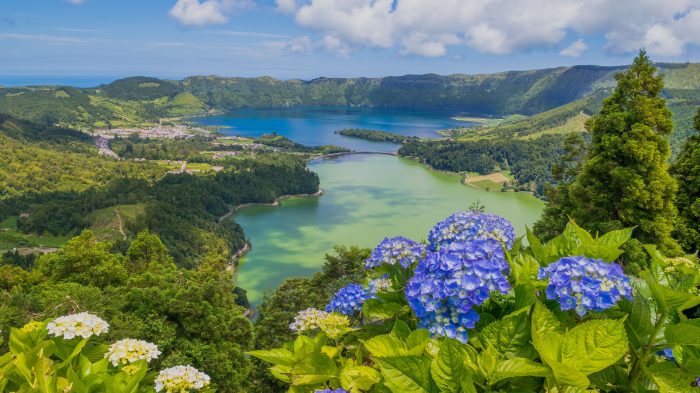
The economy of the Azores is primarily based on agriculture, tourism, and renewable energy. The islands have a long history of farming, with the main crops being dairy products, meat, and pineapples. Tourism has become increasingly important in recent years, with the islands attracting visitors with their natural beauty, cultural heritage, and outdoor activities. The Azores also have a significant renewable energy industry, with a number of wind and geothermal power plants.
Agriculture
Agriculture is the largest economic sector in the Azores, employing around 15% of the workforce. The main agricultural products are dairy products, meat, and pineapples. The islands also produce a variety of other crops, including bananas, oranges, and grapes.
Tourism
Tourism is the second largest economic sector in the Azores, employing around 10% of the workforce. The islands attract visitors with their natural beauty, cultural heritage, and outdoor activities. The most popular tourist destinations include the islands of São Miguel, Terceira, and Faial.
Renewable Energy
The Azores have a significant renewable energy industry, with a number of wind and geothermal power plants. The islands have the potential to generate more renewable energy than they consume, and they are working to become a major exporter of renewable energy to Europe.
Employment
The unemployment rate in the Azores is around 6%, which is lower than the national average. The majority of the workforce is employed in the service sector, with the largest employers being tourism and retail. The manufacturing sector is also important, with the main industries being food processing and textiles.
The Azores Islands, a breathtaking archipelago in the Atlantic Ocean, offer a tantalizing array of pristine beaches. From the golden sands of Santa Maria to the dramatic black sands of Mosteiros, the Azores boast some of the best beaches in the world.
Whether you seek secluded coves or lively surf spots, the Azores has a beach to suit every taste.
Trade
The Azores have a trade deficit, with imports exceeding exports. The main imports are food, machinery, and transportation equipment. The main exports are dairy products, meat, and pineapples.
Economic Growth
The economy of the Azores has been growing steadily in recent years. The GDP per capita is around €18,000, which is higher than the national average. The islands are expected to continue to experience economic growth in the coming years, driven by tourism and renewable energy.
Infrastructure and Development
The Azores archipelago boasts a well-developed transportation system that seamlessly connects its islands. Ponta Delgada, the capital city of the Azores, serves as the main transportation hub, with an international airport and a modern seaport.
Within the islands, a network of roads and highways provides efficient access to major towns and cities. Additionally, ferry services and inter-island flights facilitate transportation between the islands.
Urban Development and Planning
The major cities in the Azores, particularly Ponta Delgada and Angra do Heroísmo, have undergone significant urban development in recent years. These cities have implemented comprehensive planning strategies to enhance their infrastructure and preserve their historical and cultural heritage.
New residential and commercial developments have been constructed to accommodate the growing population, while green spaces and public parks have been created to provide recreational opportunities for residents and visitors alike.
Infrastructure Projects and Advancements
The Azores has witnessed several notable infrastructure projects and advancements in recent years. These include the construction of new roads, bridges, and tunnels to improve connectivity and reduce travel times.
Additionally, the region has invested in renewable energy sources, such as geothermal and wind power, to reduce its dependence on fossil fuels and promote sustainability.
Social and Community
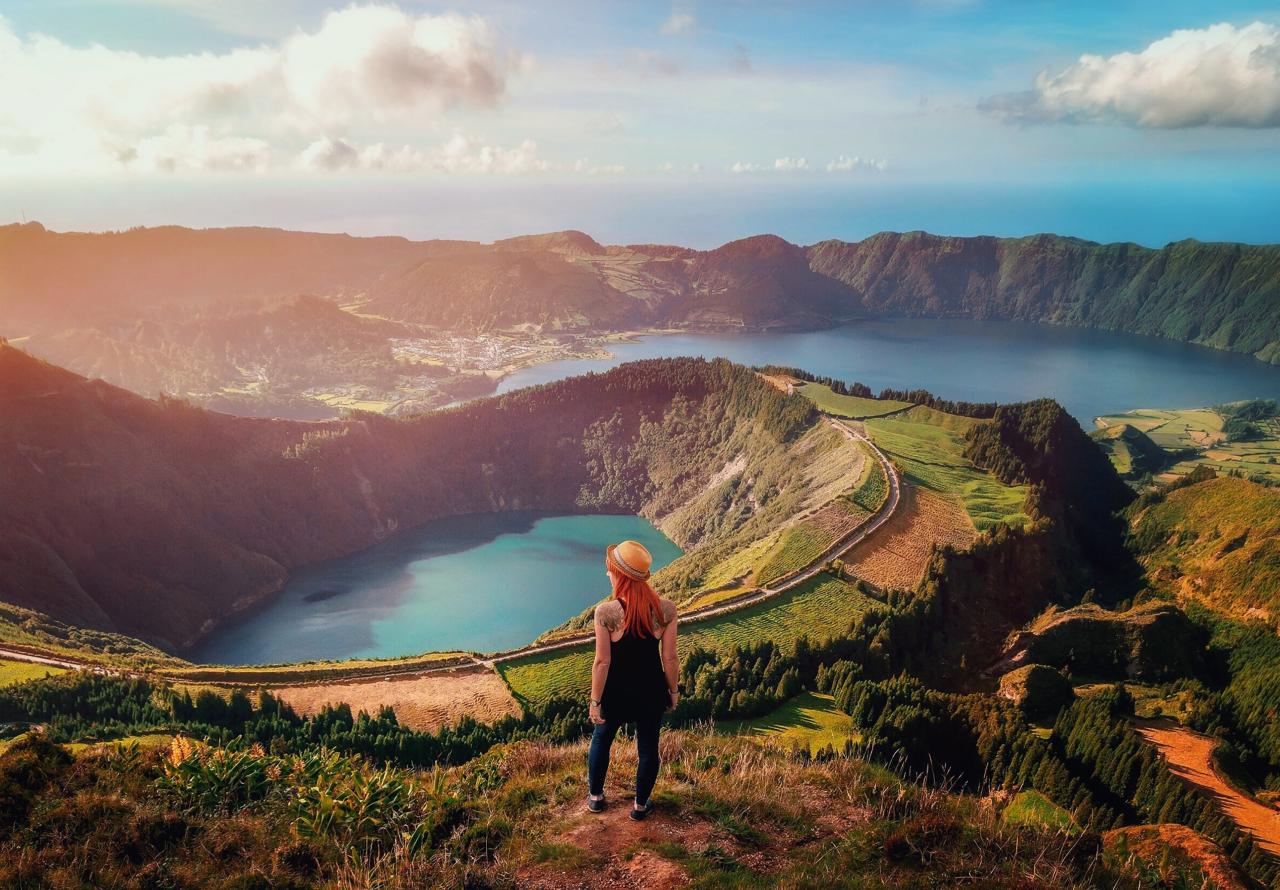
The Azores’ social structure is predominantly influenced by its island geography and historical isolation. The population of approximately 250,000 is spread across nine islands, with each island having its unique social dynamics.
The population is largely homogenous, with a strong sense of community and shared cultural values. Traditional family structures remain influential, with extended families playing a significant role in social support and cohesion.
Education
The Azores has a well-established education system that emphasizes academic excellence and vocational training. The literacy rate is high, and there are numerous primary and secondary schools throughout the islands.
The University of the Azores, located in Ponta Delgada, is the main higher education institution in the region. It offers a wide range of undergraduate and postgraduate programs in various disciplines.
Healthcare
The healthcare system in the Azores provides universal access to quality healthcare services. There are several hospitals and health centers across the islands, staffed by qualified medical professionals.
The region has a strong focus on preventive care and community-based health initiatives. There are numerous public health programs aimed at promoting healthy lifestyles and reducing the incidence of chronic diseases.
Social Welfare
The Azores has a comprehensive social welfare system that provides support to those in need. There are various programs and services aimed at assisting families, children, the elderly, and individuals with disabilities.
The government provides financial assistance, housing support, and access to essential services to ensure that all residents have a decent standard of living.
Escape to the serene Azores Islands, a sanctuary of verdant landscapes and azure waters. While these islands offer an idyllic retreat, they also serve as a gateway to vibrant destinations like and chennai. Immerse yourself in the rich history, vibrant culture, and culinary delights of this bustling Indian metropolis before returning to the tranquil embrace of the Azores Islands.
Community Initiatives
Community initiatives play a vital role in the social fabric of the Azores. There are numerous local organizations and associations that promote cultural, environmental, and social activities.
These initiatives foster a sense of belonging and community pride. They also contribute to the preservation of local traditions and the promotion of sustainable development.
The Azores Islands, a breathtaking archipelago off the coast of Portugal, is a true haven for sustainable travelers. Recognized for its commitment to preserving its pristine environment, the Azores offers a wealth of opportunities to explore its natural beauty responsibly.
From whale watching to hiking amidst lush volcanic landscapes, you can immerse yourself in the archipelago’s unique ecosystem while supporting local communities dedicated to sustainable travel destinations. Embrace the beauty of the Azores Islands and contribute to its conservation efforts.
Unique and Notable Aspects
The Azores archipelago boasts a myriad of unique and captivating attractions that set it apart from other destinations. From breathtaking natural wonders to intriguing cultural landmarks, the islands offer a diverse array of experiences for travelers.
One of the most notable features of the Azores is its stunning volcanic landscapes. The islands are home to several active and dormant volcanoes, creating a dramatic and awe-inspiring backdrop. Visitors can explore these volcanic wonders through guided tours, hikes, and boat excursions, marveling at the sheer power and beauty of nature.
UNESCO World Heritage Sites
The Azores is also home to several UNESCO World Heritage Sites, recognized for their outstanding universal value. These sites include the Angra do Heroísmo, a historic city with well-preserved fortifications and churches; the Pico Island Vineyard Culture, a unique and sustainable agricultural landscape; and the Serra da Estrela Natural Reserve, a pristine mountain range with diverse flora and fauna.
Local Legends, Myths, and Folklore
The Azores is steeped in a rich tapestry of local legends, myths, and folklore. These stories have been passed down through generations, reflecting the islands’ unique history and culture. Visitors can delve into these fascinating tales through local museums, guided tours, and storytelling sessions, gaining a deeper understanding of the Azores’ cultural heritage.
Ultimate Conclusion
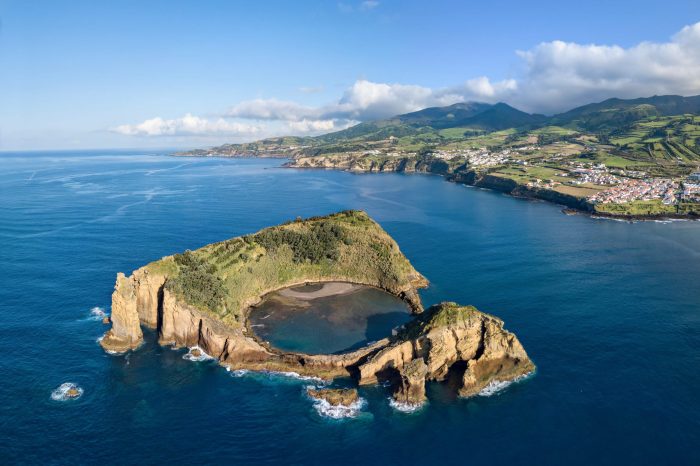
As we bid farewell to the Azores Islands, we leave with a heart filled with awe and wonder. This archipelago has captivated our senses, from its stunning landscapes to its rich cultural heritage. Whether seeking adventure, relaxation, or a glimpse into a unique way of life, the Azores offers an unforgettable experience. Let the memories of these enchanted islands forever linger in our minds, inspiring us to explore the hidden gems that our world holds.
FAQ Corner
What is the best time to visit the Azores Islands?
The Azores enjoys a mild climate year-round, making it an ideal destination anytime. However, spring (April-May) and autumn (September-October) offer the most pleasant temperatures and fewer crowds.
What are the must-visit islands in the Azores?
Each island offers unique attractions, but some popular choices include São Miguel, Terceira, Pico, Faial, and Santa Maria.
What outdoor activities can I enjoy in the Azores?
The Azores is a paradise for outdoor enthusiasts, with opportunities for hiking, biking, kayaking, surfing, diving, and whale watching.
What is the local cuisine like in the Azores?
Azorean cuisine is a blend of Portuguese and local influences, featuring fresh seafood, meat stews, and traditional dishes like Cozido das Furnas.
How do I get around the Azores Islands?
You can travel between the islands by plane or ferry. Within each island, buses, taxis, and rental cars are available for transportation.